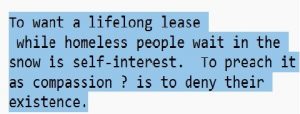NOTICE : This doesn’t mean anyone should move out. It only means that the compassion is misplaced.
Imagine you’re homeless, living in a car for five years, and you hear about a new law that says everyone with an apartment can keep it forever.
They say the endless lease is compassionate >> If you already HAVE a place, you’ll be able to stay your whole life if you want, regardless of a signed agreement, regardless of someone waiting to move in, regardless of homeless people waiting in the snow.
If someone moves out, then someone moves in, and total homelessness is unchanged. This isn’t saying you should move out. It’s just saying JCE with or without the endless lease does not prevent homelessness.
To want an endless lease — the privilege of keeping your place for life is not compassion, it is self-interest. But it denies the existence of homeless people. It implies a class of priveleged landed tenants, and that creates a lifelong homeless underclass. How compassionate is that ! Ask a real live homeless person.
Realize it. RAD is manipulating you to support this idea that is so ugly to the homeless — and at the same time the selectboard is evicting an emergency homeless shelter.
A homeless person deserves compassion more than a person with a home. This doesn’t mean you should move out. It only means that the compassion argument is false (like a lot about RAD’s campaign.) (Vote NO on article II. Wait for the original BCS amendment — without the endless lease.)







HUH?
I’ve followed the amendment and don’t have ballot in front of me, but you keep referring to “RAD” – might be nice to spell it out even once. Search on internet says “Reactive Attachment Disorder.” Seems to me that acronyms are overused with no explanation. Not just you, but far and wide.
The ballot doesn't mention any acronyms except "CPI"..... Article II:
“Shall the Charter of the Town of Brattleboro be amended to provide protections for residential tenants from evictions without ‘just cause’, by adopting and adding a new section to read as follows:
(A) Residential tenants, as defined in Chapter 137 of Title 9 of the Vermont Statutes Annotated, shall be protected
from eviction without ‘just cause,’ where just cause shall include:
(1) a tenant’s material breach of a written rental agreement,
(2) a tenant’s violation of state statutes regulating tenant obligations in residential rental agreements,
(3) non-payment of rent, and
(4) a tenant’s failure to accept written, reasonable, good faith renewal terms.
(B) This charter provision excludes from ‘just cause’ the expiration of a rental agreement as sole grounds for
termination of tenancy.
(C) Exemptions to this charter amendment, include properties defined in Chapter 137 of Title 9, in addition to;
1. sublets
2. in-unit rentals
3. owner-occupied duplexes and triplexes
4. Accessory Dwelling Units on owner’s property
(D) A landlord shall not evict a tenant for the sole purpose of raising the rent. When rent increases are legitimate, the
total rent increase, including consideration of operating expenses, maintenance expenses, capital improvements,
and cost-of-living (CPI) adjustments shall not exceed 12% in any twelve-month period.
(E) The terms of this amendment shall not be binding on a landlord in cases where the tenant is effectively evicted by
extreme weather or acts of God. Otherwise a landlord may evict a tenant for purposes such as major required
construction, lead remediation and abatement work, or housing a family members). However, the following
restrictions apply to such evictions:
(1) If a comparable unit owned by the landlord is already available, or if such a unit becomes available before
recovery of the rental unit, the landlord shall rescind the notice of eviction and dismiss any action filed to recover
possession of the unit and offer the comparable unit to the tenant at the rate currently paid by the tenant
(2) If a non-comparable unit becomes available before recovery, the landlord shall offer the non-comparable unit to
the tenant.
(3) If a landlord cannot accommodate the tenant, the landlord must pay one month’s rent as hardship and relocation
assistance
|(4) The rental unit must be offered first to the displaced tenant when the required repairs, abatement, construction or
other work is complete, or when a family member moves out before a term of 36 months.
(F) The landlord seeking to recover possession of a unit must submit with the notice of eviction a notarized affidavit
attesting to the need for the eviction, and when appropriate, the identity of the family members), and the intent of the family member(s) to have no other principal residence.
Evidence that the landlord has not acted in good faith may include, but is not limited to, any of the following:
(1) The landlord or family members) for whom the rental unit was vacated did not move into the unit within three
months of the recovery date and subsequently did not occupy the unit as a principal residence for a minimum of 36
consecutive months.
(2) The landlord rented the unit to a new tenant at an increased price exceedingly the yearly rental increase as
allowed in section C of this Charter Amendment
(G) This legislation shall take effect upon approval.
(H) If any provision of this legislation is held to be unconstitutional or to be otherwise invalid by any court of
competent jurisdiction, such invalidity shall not affect other provisions, and they are held to be severable
(I) This legislation can be rescinded in a plebiscite according to law without approval of the state legislature.
YES
NO”